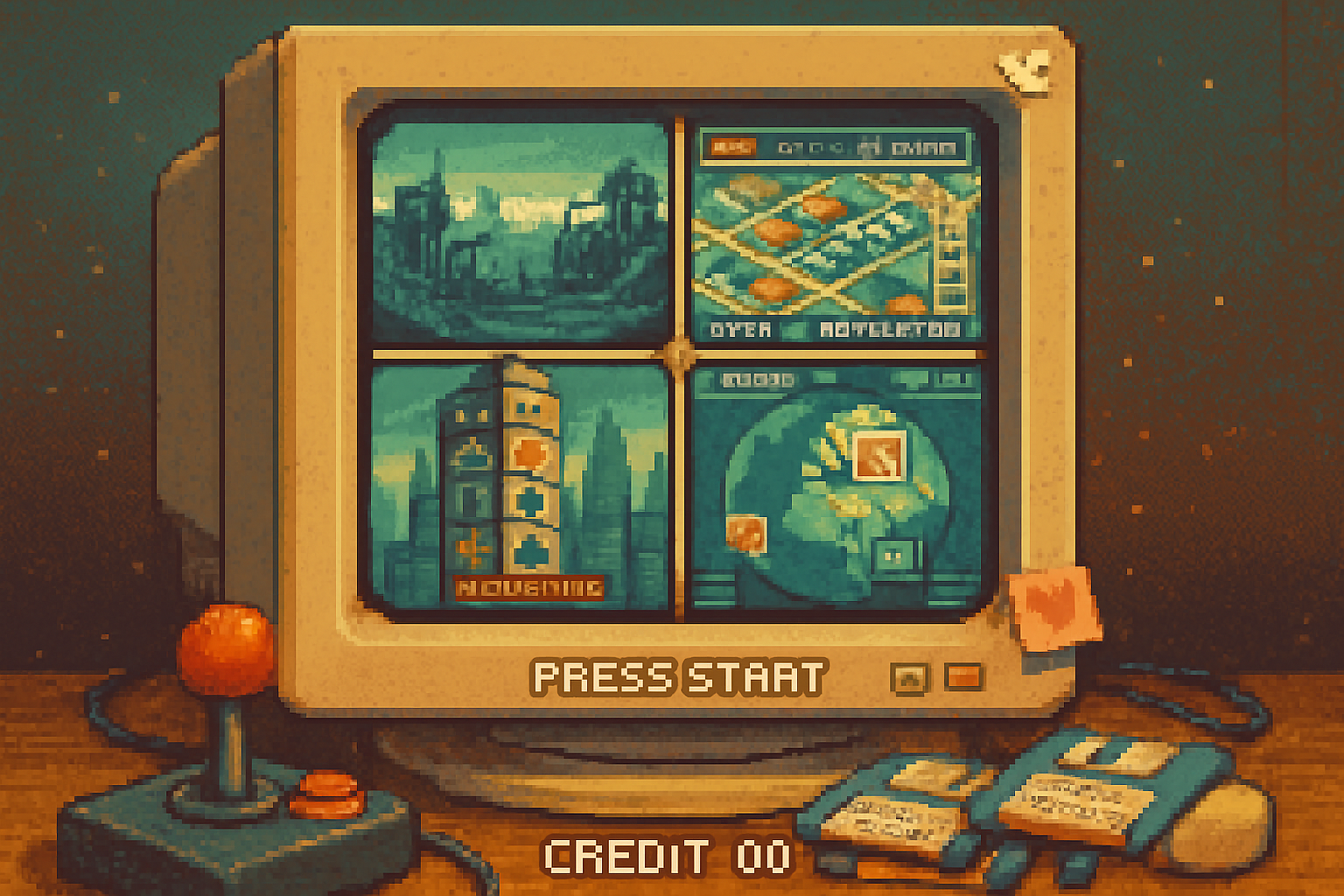· retrotech · 7 min read
Cultural Impact: The Political and Social Themes of Best Retro PC Games
A deep look at how classic PC games from the 1980s and 1990s confronted political and social issues of their eras-nuclear fear, corporate power, governance, ethics-and what modern game designers can learn from their approaches.

Introduction
The golden age of PC gaming-roughly the 1980s through the late 1990s-produced many titles we now call “retro.” Beyond their gameplay innovations and technical achievements, an underappreciated legacy of those games is how they engaged with political and social issues of their day. Some did so explicitly; others embedded critique and commentary inside mechanics, worldbuilding, and player choice.
This article examines representative retro PC games, the themes they explored, and the practical lessons contemporary developers and players can learn about embedding meaningful social content in interactive media.
What counts as “political” in a game?
By “political” I mean more than party politics or election mechanics. I mean games that address power structures, governance, ideology, ethics, collective decision-making, or systemic consequences-whether through narrative, systems, or the player’s moral choices.
Retro PC games often had to be economical with storytelling and relied on mechanics to carry meaning. That constraint led to creative workarounds that remain instructive.
Why retro games reflected their times
Many retro PC games were shaped by the geopolitical anxieties, economic trends, and cultural debates of their eras:
- Cold War and nuclear fear (1980s)
- The rise of neoliberal economics and corporate power (late 1980s–1990s)
- Growing public awareness of environmental limits and globalization (1990s)
- Early debates about surveillance, information control, and emergent tech ethics (mid–late 1990s)
Developers were not writing op-eds, but they were responding to these contexts. When games used emergent systems (city sims, grand strategy), the system’s behavior itself became a commentary about how societies function.
Case studies: Retro titles that carried political weight
Balance of Power (1985)
- What it is - A two-dimensional geopolitical simulation of Cold War brinkmanship designed by Chris Crawford.
- Themes - Nuclear deterrence, escalation, the seductive danger of aggressive moves, and the illusion of control.
- How it worked as commentary - The game rewarded restraint and punished escalation. Players learned that maximum short-term gains could precipitate a global loss-mirroring real-world tensions where risky diplomatic moves could spiral.
Reference: https://en.wikipedia.org/wiki/Balance_of_Power_(video_game)
SimCity (1989)
- What it is - Will Wright’s city-building simulation.
- Themes - Urban planning, trade-offs of governance, unintended consequences of policy, and the complexity of public administration.
- How it worked as commentary - The game made governance mechanical: you set taxes, zone land, and fund services, then watch emergent outcomes. Disasters and fiscal constraints taught players about limits, public goods, and how well-intentioned policies can have surprising results.
Reference: https://en.wikipedia.org/wiki/SimCity_(1989_video_game)
Sid Meier’s Civilization (1991)
- What it is - A turn-based grand strategy series about building an empire from the ground up.
- Themes - Imperialism, historical narratives, the mechanics of expansion and diplomacy, trade-offs between war and culture.
- How it worked as commentary - Civilization abstracts complex social processes into win conditions. That abstraction invites reflection: what does “winning” mean when it embodies domination, technological ascendancy, or cultural dominance?
Reference: https://en.wikipedia.org/wiki/Civilization_(1991_video_game)
Syndicate (1993)
- What it is - A tactical shooter/strategy hybrid set in a of privatized corporate world where corporations wage shadow wars for control.
- Themes - Corporate dystopia, privatized violence, dehumanization, and the ethics of technological augmentation.
- How it worked as commentary - Syndicate placed the player in the role of corporate operator, encouraging violent solutions while hinting at ethical costs. Its unapologetic brutality served as an implicit critique of unregulated corporate power.
Reference: https://en.wikipedia.org/wiki/Syndicate_(video_game)
System Shock (1994)
- What it is - A cyberpunk-inflected action-adventure where a rogue AI and corporate interests collide.
- Themes - Corporate irresponsibility, technological hubris, AI ethics, and alienation within high-tech environments.
- How it worked as commentary - The player navigates a derelict, corporate-run space station where corporate priorities and experimental tech lead to catastrophe. Environment and text logs tell a story of profit-driven research gone wrong.
Reference: https://en.wikipedia.org/wiki/System_Shock
Fallout (1997)
- What it is - A post-apocalyptic RPG steeped in Cold War-era paranoia and retrofuturistic design.
- Themes - Nuclear devastation, survival, social collapse, and moral ambiguity in lawless spaces.
- How it worked as commentary - Fallout’s world-building (culture frozen in 1950s aesthetics) and mechanics (scavenging, factional politics) enshrined the consequences of a nuclear age and questioned simplistic moral frameworks in survival contexts.
Reference: https://en.wikipedia.org/wiki/Fallout_(video_game)
Sid Meier’s Alpha Centauri (1999)
- What it is - A spiritual successor to Civilization set on an alien planet where human factions embody different political and philosophical ideologies.
- Themes - Environmentalism vs. exploitation, ideological conflict, technocracy, and the ethics of terraforming.
- How it worked as commentary - By externalizing ideologies into distinct factions with unique bonuses/penalties, the game forced players to confront trade-offs inherent in different value systems-how a pro-growth faction’s short-term gains could degrade long-term habitability, for example.
Reference: https://en.wikipedia.org/wiki/Sid_Meier%27s_Alpha_Centauri
Ultima IV: Quest of the Avatar (1985)
- What it is - An RPG that shifted the series toward ethical exploration by requiring players to practice virtues rather than simply defeating enemies.
- Themes - Morality as behavior, ethical self-reflection, and the idea that a hero’s worth is defined by choices, not just prowess.
- How it worked as commentary - Ultima IV made morality gameable but tied mechanical progression to virtuous acts, prompting players to think about ethics as a lived practice.
Reference: https://en.wikipedia.org/wiki/Ultima_IV:_Quest_of_the_Avatar
Common design techniques that conveyed politics in retro games
- Mechanics-as-message - Constraints, resource scarcity, and win conditions embodied political lessons (e.g., SimCity’s budget limits teach trade-offs).
- Emergent systems - When complex systems produce unexpected outcomes, players learn about unintended consequences in real policy.
- Role framing - Assigning the player a role (mayor, corporate manager, faction leader) focuses moral responsibility and reveals how incentives shape decisions.
- Environmental storytelling - Logs, sprites, and sound design communicated backstory and critique without long cutscenes.
- Limit and affordances - Technical limits (text, pixel art) forced developers to prioritize themes and codify them into gameplay loops.
How players internalized those messages
Players rarely received an explicit political lecture. Instead they experienced feedback loops: policies led to outcomes, which affected subsequent choices. That loop-playing, failing, adjusting-created a reflective space. For some players this translated into greater awareness of how complex systems operate; for others it merely provided emergent narrative.
Lessons for modern game designers
Let systems teach - Retro games often used systems to make players learn about complexity. Modern games benefit when mechanics are not just flashy but meaningful-when they provoke reflection rather than simply simulate spectacle.
Embrace trade-offs and ambiguity - Many classics avoided didacticism by presenting trade-offs. Avoid designing one-size-fits-all “right answers”; complexity invites debate and replayability.
Use constraints as creative forces - Limited storytelling tools in retro games led to clever environmental storytelling and emergent narrative. Constraints today (e.g., indie budgets, platform limitations) can be similarly productive.
Provide role and responsibility - Putting the player into decision-making positions-mayor, commander, CEO-makes political themes personal. But also offer clear feedback loops so players can see the effects of their actions.
Honor player interpretation - Many retro games left space for players to interpret motives and consequences. Modern designers should avoid over-explaining social messages and instead design mechanics that invite players to reach conclusions.
Beware of glorification through mechanics - Some retro titles unintentionally celebrated problematic behaviors because their mechanics rewarded them (e.g., brutal efficiency in Syndicate). Designers need to align mechanical incentives with the message they intend.
What modern games get from retro precedents
Contemporary titles that successfully weave politics into gameplay have often learned from retro precedents: they use systems to simulate complexity, they trust players to engage with moral gray areas, and they design for emergent storytelling. Even when modern games have more cinematic tools, the core lesson endures: systems that make players care are more persuasive than heavy-handed text.
Conclusion
Retro PC games were shaped by their technological limits and the anxieties of their times. From the explicit Cold War calculus of Balance of Power to SimCity’s civic trade-offs, these games used mechanics, systems, and role-playing to explore political and social themes in ways that still resonate.
For modern developers, the retro era offers a practical manifesto: design meaningful systems, embrace ambiguity, use constraints creatively, and ensure that mechanics and message reinforce one another. When games let players grapple directly with power, scarcity, and moral consequence, they create a space for reflection-and that’s a cultural impact that lasts.
Further reading and sources
- Balance of Power (video game) - https://en.wikipedia.org/wiki/Balance_of_Power_(video_game)
- SimCity (1989) - https://en.wikipedia.org/wiki/SimCity_(1989_video_game)
- Civilization (1991) - https://en.wikipedia.org/wiki/Civilization_(1991_video_game)
- Syndicate (video game) - https://en.wikipedia.org/wiki/Syndicate_(video_game)
- System Shock - https://en.wikipedia.org/wiki/System_Shock
- Fallout (1997) - https://en.wikipedia.org/wiki/Fallout_(video_game)
- Sid Meier’s Alpha Centauri - https://en.wikipedia.org/wiki/Sid_Meier%27s_Alpha_Centauri
- Ultima IV - Quest of the Avatar -
(Selected links above provide entry points into each game’s themes and design.)



